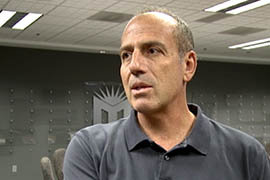Cronkite News has moved to a new home at cronkitenews.azpbs.org. Use this site to search archives from 2011 to May 2015. You can search the new site for current stories.
Phoenix to begin phasing out ‘emergency’ sales tax on food
PHOENIX – The nation’s sixth-largest city is ready to begin phasing out an “emergency” sales tax on food that was added in 2010 to address a massive budget deficit.
While concerns about cuts to services delayed efforts to get rid of the 2 cents-per-dollar tax, leaders said the city is prepared to make up for the lost revenue.
Councilman Sal DiCiccio, who voted against the tax, said it affects poorer people disproportionately because they spend a larger share of their income on food.
“What the public wants is the food tax gone – clearly, across the board,” he said. “And it’s not just in my district; it’s across the board.”
The plan calls for cutting the sales tax to 1 cent per dollar as of Jan. 1 and then allowing the tax to sunset in 2015, as called for when the City Council approved it.
“I think it was a tax that had to be at the time,” Councilwoman Thelda Williams said. “I also think it’s time that we kept our word and we begin to reduce it and totally eliminate it on schedule, as the public was told.”
Facing a $277 million deficit on a budget of $1 billion, the city added the tax in early 2010 on staples such as milk, meat and vegetables. For a family of four that spends around $150 a week on groceries, it works out to an extra $150 a year.
Outgoing City Manager David Cavazos has said the Jan. 1 reduction would cost the city $33.4 million annually. In a memo, he suggested refinancing debt, streamlining operations and selling off extra land to make up for the revenue.
“If we could actually sell two or three of our properties, we could make up the funding that we need – or that gap that we need – to fund the rest of the food tax,” Councilman Michael Nowakowski said.
The City Council is holding public hearings as it prepares to vote on the plan next month. On a recent weekday, not one person attended hearings in central and north Phoenix.
Two Arizona State University economists questioned phasing out the tax without another stable source of revenue in its place.
Tom Rex, associate director of the Center for Competitiveness and Prosperity Research at the W.P. Carey School of Business’ L. William Seidman Research Institute, said selling land, for example, is a short-term fix.
“But the next time the economy goes bad, you’re just going to have to cut even deeper, and chances are you’re going to be cutting into services that you’re providing to the same set of people that are being benefited from not paying the tax,” he said.
Dennis Hoffman, a professor of economics at the W.P. Carey School of Business, said the City Council should focus on broadening the tax base rather than turning away from a food tax as being regressive. He said the city could offer low-income people a rebate on the food sales tax, for example.
“My simple point is: I don’t think we should be turning our backs on food taxes, purely on this simplistic notion of regressivity,” he said.
But DiCiccio said it’s time for the food sales tax to go.
“This has been controversial since 2010,” he said. “It’s time to get past that, and the only way to get past that is to start the gradual removal of the tax.”







